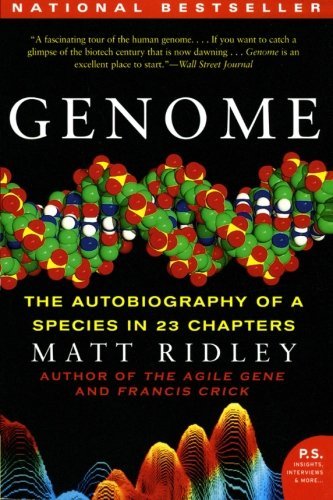
Genome
The Autobiography of a Species in 23 Chapters
by Matt Ridley
Published By: Harper Collins, 1999
Genre: Nonfiction | Science & Technology
Page Count: 368 (Paperback)
Audiobook Length: 12 hours and 20 minutes
Audiobook Narrator: Simon Prebble
ISBN: 9780060894085
Publisher’s Description
The most important investigation of genetic science since The Selfish Gene, from the author of the critically acclaimed and best-selling The Red Queen and The Origins of Virtue.
The genome is our 100,000 or so genes. The genome is the collective recipe for the building and running of the human body. These 100,000 genes are sited across 23 pairs of chromosomes. Genome, a book of about 100,000 words, is divided into 23 chapters, a chapter for each chromosome. The first chromosome, for example, contains our oldest genes, genes that we have in common with plants.
By looking at our genes we can see the story of our evolution, what makes us individual, how our sexuality is determined, how we acquire language, why we are vulnerable to certain diseases, and how the mind has arisen. Genome also argues for the genetic foundations of free will. While many believe that genetics proves biological determinism, Ridley will show that in fact free will is itself in the genes. Everything that makes us human can be read in our genes. Early in the next century, we will have determined the function of every one of these 100,000 genes.
About the Author
Matthew White Ridley is a British author, journalist, and biologist. Born on February 7, 1958, Ridley has made significant contributions to the fields of science, economics, and popular science writing.
Ridley was educated at Eton College and later studied at Magdalen College, Oxford, where he earned a bachelor’s degree in zoology. His background in biology has strongly influenced his work, allowing him to explore the intersection of science and society in a unique and compelling manner.
Matt Ridley’s career has been multifaceted. He served as the science editor for The Economist from 1984 to 1987 and has contributed articles to various publications, including The Wall Street Journal and The Times. Beyond his journalistic pursuits, Ridley is widely recognized for his engaging books on science, genetics, and evolution.
